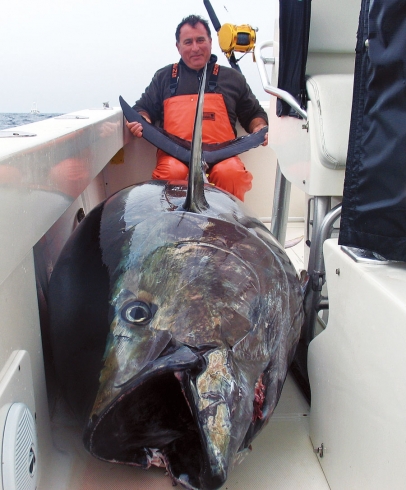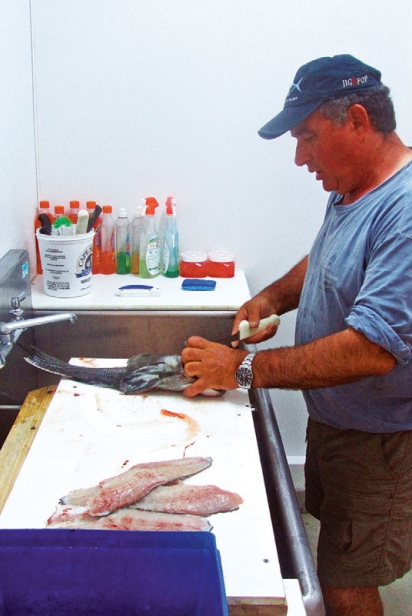Demetrios “Jimmy” Koutalakis, The Fish Whisperer
Garage sushi is not an expression one often (or ever) hears, but for our family it elicits a response of excitement and anticipation. It means that our neighbor, Demetrios Koutalakis, or Jimmy, has caught a tuna and is slicing and serving it in his surgically-clean garage.
When Jimmy’s garage door is open, it means fish are being cleaned and cut, and there is no greater culinary treat for us. Neighbors casually wander in, pull up folding chairs, and help themselves as he stands over his garage sink, slicing what appears to be an endless supply of the most delicious and fresh-tasting tuna we’ve ever sampled. He serves it up along with tales of the sea, a quick smile, a modest manner, and great generosity. Jimmy is a man who clearly lives every day to the fullest, is grateful for all he has achieved, and doesn’t tend to question the surprises life gives him.
Jimmy is the owner of On Time Sportfishing (ontimesportfishing.com), which he operates from roughly May to October. The rest of the year he works at his jewelry store in Arlington, Massachusetts. He is quick to say that fishing has always been his passion, from his boyhood on the island of Crete, where he spent every free moment in the ocean fishing and free diving, to his current time on the Cape, shepherding clients to the best fishing spots and providing them with an unforgettable experience. His connection to the water is deep and one might say, nearly mythic. Like Poseidon wielding his trident, Jimmy uses both modern devices and an innate instinct to track down fish. He has a success that other charter fishermen can only envy. When there are seemingly no fish to be found on a given day, Jimmy finds them. He says he never returns from a trip without a catch.
To better understand what sets Jimmy’s charter business apart from others on the Cape, I needed to learn a bit about his history. His father, a watch repairman in Crete, was struggling to make enough money to support his family, so they immigrated to America when Jimmy was a young teen. They lived in Arlington with Jimmy’s aunt while he and his father worked for three months at a factory to repay their airfare. No one in the family spoke any English, which made everyday activities in this country very challenging. Jimmy carried an English/Greek dictionary with him at all times, sneaking peeks whenever he heard a word he did not understand. Once there was enough money, the family rented their own house in Arlington where Jimmy and his father worked for about five years in a sheet metal factory that manufactured fasteners. After this time of frugal living, Jimmy’s father opened his own jewelry repair shop, with Jimmy as his assistant. Eventually Jimmy moved to Harvard and had his own jewelry store in Arlington, but the sea was always calling out to him.
Because fishing is a hobby with significant expenses, Jimmy did some part-time commercial fishing to cover his costs. When I asked what changes he has seen over the years in both commercial and recreational fishing, he said that prior to 2009 there were far fewer government regulations and therefore it was less expensive. As a result of more stringent and all-encompassing government control, recreational fishermen are being driven out of the picture while commercial fishermen are being favored. Due to this imbalance, Jimmy believes certain species are virtually being wiped out. In the 1980s, as hook and line fishermen, Jimmy and a friend could easily bring in between 1000 to 1200 pounds of fish per day. Today, fishing in the same area, they would be lucky to take away 50 pounds of fish. In this same vein, Jimmy expresses concern over a Massachusetts law allowing draggers (fishing boats using trawls or dragnets) to harvest herring, which is depleting the main food source for many fish. Ironically, the fish that feed on herring—squid, mackerel, and whiting —are noted for their delicious taste, which is attributable to the fatty nature of the herring, the fish being depleted in these waters.
Finally, by 2011, Jimmy and his wife, Rosa, found their dream Cape Cod summer home in Marstons Mills, allowing him to fish the waters he loves so much. He says that because the water here is so abundant with a wide variety of fish, it reminds him of Crete. He started his charter business in 2009, but moving to the Cape made it considerably easier to operate. His clients come from all over the world, but 40% of them come from Asia, mainly Korea and Japan. Word of mouth has garnered him a large, happy, and repeat clientele. Eyes twinkling, he claims that word of mouth is his only marketing campaign.
How does he decide where to fish each day? First and foremost, he said, is asking his customers what fish they want to target. That decision is determined greatly by the time of year. Tuna, for instance, are more readily found from the middle to the end of May and most of June, with the chances for catching them improving with each passing day; by July and August, the rising water temperature makes catching tuna a greater challenge. The appearance of striped bass is dictated strictly by water temperature, and last year they arrived late, due to the changing water temperature patterns.
After determining what fish he will pursue, Jimmy then must rely on a combination of resources, first of which is his long-established network of fellow fishermen, and that network, he admits, must be tended to faithfully, both by sharing information and establishing trust with one another. Many of his fellow charter fishermen keep a log of where they’ve caught fish, but not Jimmy. He prefers keeping mental notes. He is a particularly keen observer of the habits and behavior of fish, paying attention to the depths and water temperatures where they are found. Also, he confesses, satellites are invaluable since they read water temperature.
Another practice Jimmy employs after each tuna catch is closely examining the fish’s stomach contents so he knows what its food source is. He also needs to know where to find the best bait since it is important for catching the desired fish. The final step in this quest is probably the most critical: locating the fish. Fish have three specific needs: safety, comfort, and availability of food. Once these are determined, he will find his fish. He concedes, though, that the final word on detecting the location of fish belongs to nature, and he quickly adds that the sighting of whales and shearwaters always indicates an abundance of sea life.
Of course it was inevitable that I would ask Jimmy about the show, Wicked Tuna, and why he wasn’t on it. He good-naturedly responded by saying that he indeed had been asked to be on the show. He turned down the offer, reasoning it was only a temporary commitment, providing the proverbial fifteen minutes of fame, and the money involved was substantially less than what he receives doing charter work. Also, since 90% of his clients are repeat business, he didn’t wish to disappoint them by not being available. So while television fame may have eluded him, Jimmy is the person the Wicked Tuna fishermen consult with on a daily basis for their fishing information.
Jimmy’s charter business is unusual in that he trailers his boat, a new 34-foot SeaVee, to wherever the fish are congregating. Having that flexibility is a decided advantage in this business and his clients are appreciative, judging by their high rate of return. Jimmy notes that the water is warmer each year, making August the month in which he must travel farthest afield for fish. In June, fish are nearer the surface, but as the water warms, they go deeper. Their bodies can thermoregulate, allowing them to remain as deep as necessary. He noted that for most of the year, however, all of the fish he could possibly want to catch are here in Cape Cod’s bountiful water.
When asked what is it about the charter business that appeals to him so much, Jimmy answered that every day is unique, no two days are ever repeated. He shared this statement with his fellow charter captains, saying they give their clients a sporting experience with the reward of harvest. The thrill of the hunt, locating the fish, and then catching them is his passion; studying and learning the changing pattern of their behavior creates the challenge. For Jimmy, life without a challenge or passion is not worth living. Hearing him describe the adrenaline rush of spotting fish on the water’s surface having a feeding frenzy, needing to make the split-second decision of what to do in order not to scare them, you can almost smell the salt water, feel the sea breeze and rocking motion of the boat, and imagine the excitement of the chase.
Jimmy takes his work very seriously and feels a clear responsibility to his clients: to satisfy them, be safe, and help them catch fish, harvesting only what is allowed by law. What sets Jimmy’s charter business apart from the others is that people who have fished with him know there will always be a great adventure, many stories, and always fish to take home. Time and again I heard the same claim from his customers, that a fishing trip with Jimmy is an experience not to be missed. When his boat was out of commission temporarily and he offered his clients another charter service, they declined, saying it wasn’t about the fishing but rather about a day spent with Jimmy. In Jimmy’s case it would be impossible to separate the man from the business since he is the business. A steward of the sea, a man who clearly loves every day that takes him out to his real home and affords him the privilege of harvesting its treasures.






